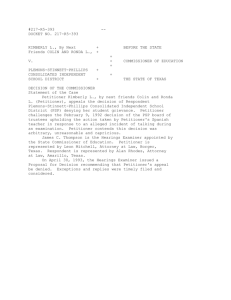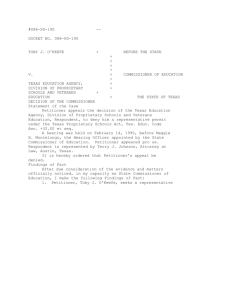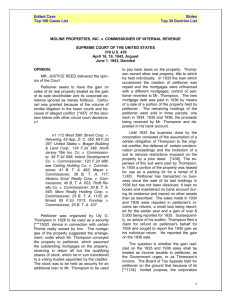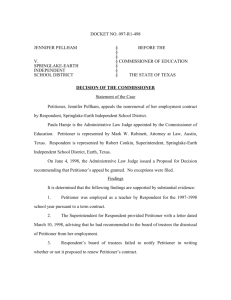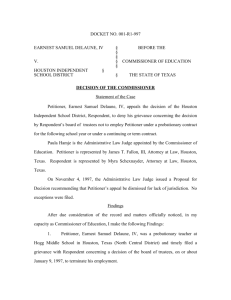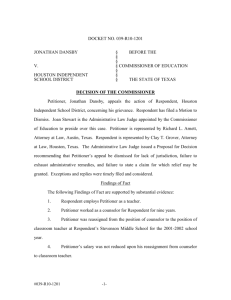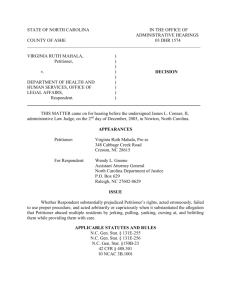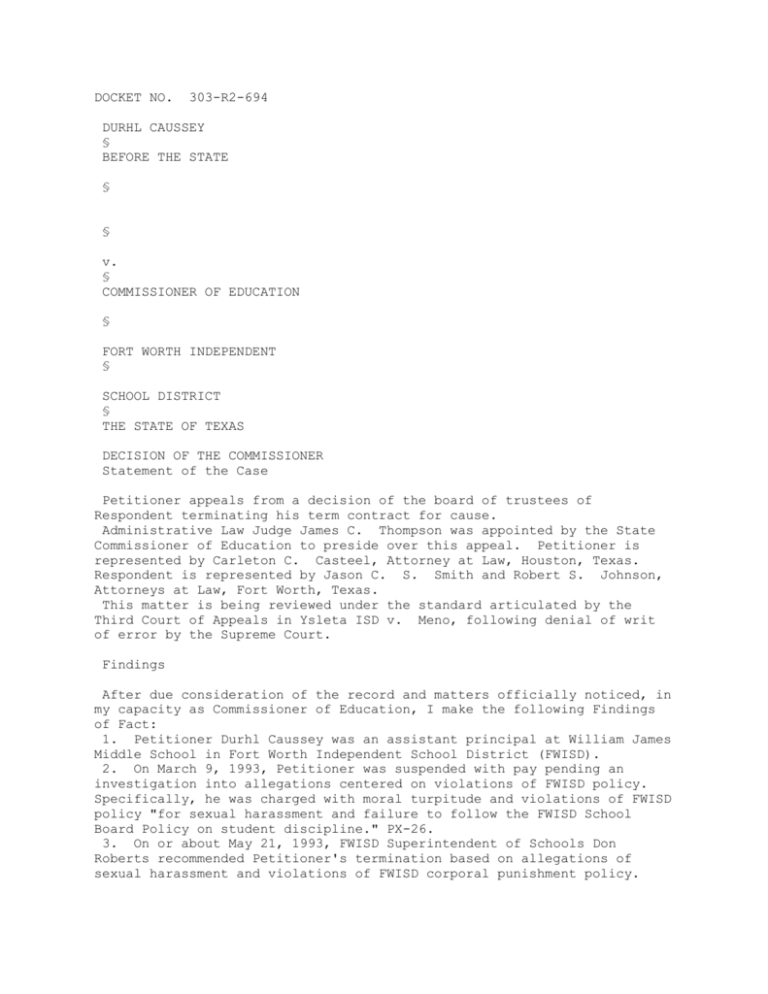
DOCKET NO.
303-R2-694
DURHL CAUSSEY
§
BEFORE THE STATE
§
§
v.
§
COMMISSIONER OF EDUCATION
§
FORT WORTH INDEPENDENT
§
SCHOOL DISTRICT
§
THE STATE OF TEXAS
DECISION OF THE COMMISSIONER
Statement of the Case
Petitioner appeals from a decision of the board of trustees of
Respondent terminating his term contract for cause.
Administrative Law Judge James C. Thompson was appointed by the State
Commissioner of Education to preside over this appeal. Petitioner is
represented by Carleton C. Casteel, Attorney at Law, Houston, Texas.
Respondent is represented by Jason C. S. Smith and Robert S. Johnson,
Attorneys at Law, Fort Worth, Texas.
This matter is being reviewed under the standard articulated by the
Third Court of Appeals in Ysleta ISD v. Meno, following denial of writ
of error by the Supreme Court.
Findings
After due consideration of the record and matters officially noticed, in
my capacity as Commissioner of Education, I make the following Findings
of Fact:
1. Petitioner Durhl Caussey was an assistant principal at William James
Middle School in Fort Worth Independent School District (FWISD).
2. On March 9, 1993, Petitioner was suspended with pay pending an
investigation into allegations centered on violations of FWISD policy.
Specifically, he was charged with moral turpitude and violations of FWISD
policy "for sexual harassment and failure to follow the FWISD School
Board Policy on student discipline." PX-26.
3. On or about May 21, 1993, FWISD Superintendent of Schools Don
Roberts recommended Petitioner's termination based on allegations of
sexual harassment and violations of FWISD corporal punishment policy.
4. A pre-termination hearing was held on two separate days: February 3,
1994 and April 19, 1994.
5. A few days before this evidentiary hearing, Respondent unilaterally
dropped all charges of sexual harassment and proceeded solely on the
basis of the corporal punishment violations.
6. The board of trustees, on a vote of five to one, accepted
Superintendent Roberts' recommendation and terminated Petitioner for
violations of FWISD corporal punishment policy.
7. Petitioner timely appealed this decision to the Commissioner of
Education.
8. When he was terminated, Petitioner was assigned to William James
Middle School as assistant principal.
9. Petitioner was responsible for administering discipline to the male
student body of the "home school."
10. Petitioner's immediate supervisor and evaluator at William James
Middle School was Principal George Thompson.
11. Petitioner failed to maintain records of the instances when he
imposed corporal punishment, a violation of Policy FOB-1.
12. Petitioner "popped 200 kids" but did not file one report with the
Office of Student Affairs, as required by Policy FOB-1.
13. Petitioner failed to notify parents that corporal punishment was
proposed before he imposed it, as required by Policy FOB-1.
14. Petitioner failed obtain permission from a parent or guardian prior
to imposing corporal punishment, as required by Policy FOB-1.
15. Petitioner failed to confer with teachers referring students for
discipline, as required by Policy FOB-1.
16. Petitioner imposed corporal punishment in a manner not authorized
by Policy FOB-1.
17. Petitioner imposed unreasonable and inappropriate corporal
punishment by administering corporal punishment in front of other
students, in violation of Policy FOB-1, FOB, the district's standards of
professional conduct and the directives of his principal.
Discussion
Education Code §21.210, "Discharge for Cause," provides that "Nothing in
[the TCNA] shall prohibit a board of trustees from discharging a teacher
for cause during the term of the contract." In this case, FWISD has
sought to exercise this right reserved under the TCNA. The district has
articulated good cause in its charges of moral turpitude and violation of
FWISD policy. The acts alleged by the district under the rubric of
"failure to follow the FWISD School Board Policy on student discipline"
were serious and clearly inconsistent with continued employment.
The Texas courts have defined "good cause" as follows:
Good cause for discharging an employee is defined as the employee's
failure to perform the duties in the scope of employment that a person of
ordinary prudence would have done under the same or similar
circumstances. An employee's act constitutes good cause for discharge if
it is inconsistent with the continued existence of the employer-employee
relationship.
Lee-Wright, Inc. v. Hall, 840 S.W.2d 572, 580 (Tex. App.--Houston
[1st Dist.] 1992, no writ). Good cause is a high standard. An employee
must not only fail to perform as an ordinary employee would, but the
failure must be of a serious nature. The Commissioner of Education has
adopted this standard in Baker v. Rice CISD, Docket No. 227-R2-493
(Comm'r Educ.). The Commissioner has consistently held that for a
teacher or administrator to be terminated, there must be a serious
failing. Short v. Rains ISD, Docket No. 214-R2-386 (Comm'r Educ.).
Whether remedial training or an opportunity to improve one's performance
is required needs to be assessed on a case by case basis. There is no
"right to remediation" per se: The standard for termination is the LeeWright standard. Thus, if a teacher's actions are sufficiently severe,
no remediation is required at all. Some failings do not rise to the
level of good cause without evidence that reasonable efforts have been
made to afford the employee opportunity to improve, and that these
efforts have been to no avail. After such reasonable efforts, it is the
cumulative state of affairs between employer and employee, including the
employee's failure to respond to the efforts of the employer, which gives
the employer good cause to terminate the relationship.
In the present case, under the substantial evidence standard of review,
an opportunity to address his shortcomings is not required before one can
fairly say that Petitioner's conduct is "inconsistent" with continued
employment at FWISD. Petitioner's numerous violations of board policy,
which placed students in jeopardy of disparagement and which did not
comport with parental involvement and knowledge are supported by
substantial evidence. Substantial evidence supports a finding of good
cause for termination.
Conclusions of Law
After due consideration of the record, matters officially noticed, and
the foregoing Findings, in my capacity as Commissioner of Education, I
make the following Conclusions of Law:
1. The Commissioner of Education has jurisdiction over this appeal.
2. Good cause for discharging an employee is defined as the employee's
failure to perform the duties in the scope of employment that a person of
ordinary prudence would have done under the same or similar
circumstances. An employee's act constitutes good cause for discharge if
it is inconsistent with the continued existence of the employer-employee
relationship.
3. Substantial evidence exists to support the finding of the board of
trustees that Petitioner's repeated violations of district student
discipline policies were inappropriate and potentially harmful to
students.
4. Respondent had good cause to terminate Petitioner's contract of
employment.
5. Petitioner's appeal must be DENIED.
O R D E R
After due consideration of the record, matters officially noticed, and
the foregoing Findings and Conclusions of Law, in my capacity as
Commissioner of Education, it is hereby
ORDERED that Petitioner's appeal be, and is hereby, DENIED.
SIGNED AND ISSUED this 3 day of September, 1997.
_______________________
MIKE MOSES
COMMISSIONER OF EDUCATION
1
4
#303-R2-694


